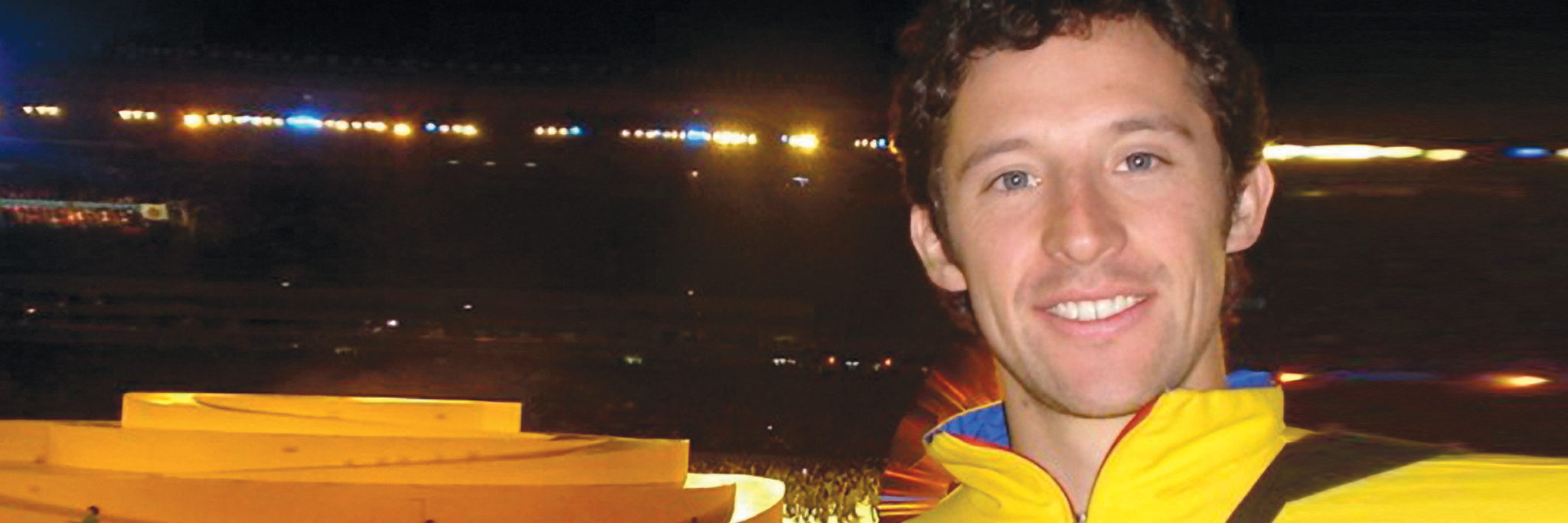An eruption of noise replaced the brief silence as the crowd digested what just happened. Suffering from a bad ankle, Javier Castilla quickly stepped right and fired a behind-the-back shot into the left corner, leaving his opponent gawking at the match-ending point. One down, one to go for Team Colombia. The Pan Am Games, held every four years, may not attract much American media attention, but they’re a big deal for Latin American countries. And since the Olympic Games don’t include squash, claiming the team gold in Rio de Janeiro this summer was the realization of Castilla’s highest squash aspiration, and a feat he never realistically expected to happen.
“I still can’t believe I stood up there on the highest level of that podium,” Castilla says of his trek to the top, which was met with constant adversity from the get-go. Two of the three spots on Colombia’s squash squad were automatically claimed by others based on world rankings. While Castilla had played well all year, the Colombian Squash Federation still had some reservations about taking him. Their stance seemed rather odd, considering that he had previously held the top spot in both the Colombian and Bogotá pro rankings, won silver and bronze medals at the Central American and Caribbean games in 2006, and a gold medal at the South American squash games in 2007. So to convince them, he advanced through a qualifying series undefeated, then he had to practice from the wee hours until 11 a.m. each morning, which interfered with his job as an environmental consultant at the firm Hidromecanicas Ltda. in Bogotá. “I was lucky that my boss and company agreed and supported me,” he says.
Castilla put any remaining doubts to rest on Monday, July 16, when he defeated his Peruvian opponent in the opening round of the Pan Am Games. The victory came with a price, however—a sprained ankle that swelled to the size of his knee. But Castilla had to at least step on the court the next day as the team didn’t have an alternate player. He couldn’t put up a fight in matches against Brazil and Venezuela, dropping both by scores of 0-9, 0-9, 0-9. So Castilla relied on his teammates to advance and they did not disappoint. Team Colombia finished second in its four-seed division to earn a quarter-final match against Argentina.
Castilla prepared for Wednesday with ample amounts of physiotherapy and tape, plus a shot to numb the pain, but he still had difficulty moving during the quarterfinal match against Argentina. He credits his four-set victory to smart play and mental toughness. The same goes for his semi-final win against former Pan Am champion Marcos Mendez of Mexico the following day, when Castilla again prevailed in four sets.
Castilla was admittedly nervous for his showdown in the finals against Robin Clarke of Canada, a perennial powerhouse. With a big, boisterous crowd surrounding the glass-walled court, he won the first set before the pain returned and he dropped the second. Castilla managed to block it out during a short break and win the third and fourth sets, giving Colombia the first of two points needed to win the title. Castilla’s teammate Miguel Angel Rodriguez then won his match, clinching the gold.
Castilla never expected to be part of the first Latin American team to win the Pan Am squash title—certainly not fourteen years earlier when he first picked up a racket at summer camp. After years of training, Castilla found himself teaching the sport at a camp at Princeton University, where Denison squash captain Gaurav Mittal ’02 encouraged Castilla to apply to his school. He went on to be Denison’s top player four years straight, earn All-America honors each year and become the sixth-ranked collegiate player in the U.S.
After graduating, Castilla taught squash for two years in Greenwich, Connecticut, before returning to his native country to put his environmental studies degree to use. He still travels at least two weekends a month to play on the Colombian tour, but his job prevents him from competing in many international events.
Spending hours training five mornings and five nights a week while holding a full-time job takes its toll, but Castilla has no qualms about the time commitment. “Handling this schedule is hard for your body and mind but it really brings good results,” he says. “At the end, you realize that it was worth it to spend all that time and effort.”

